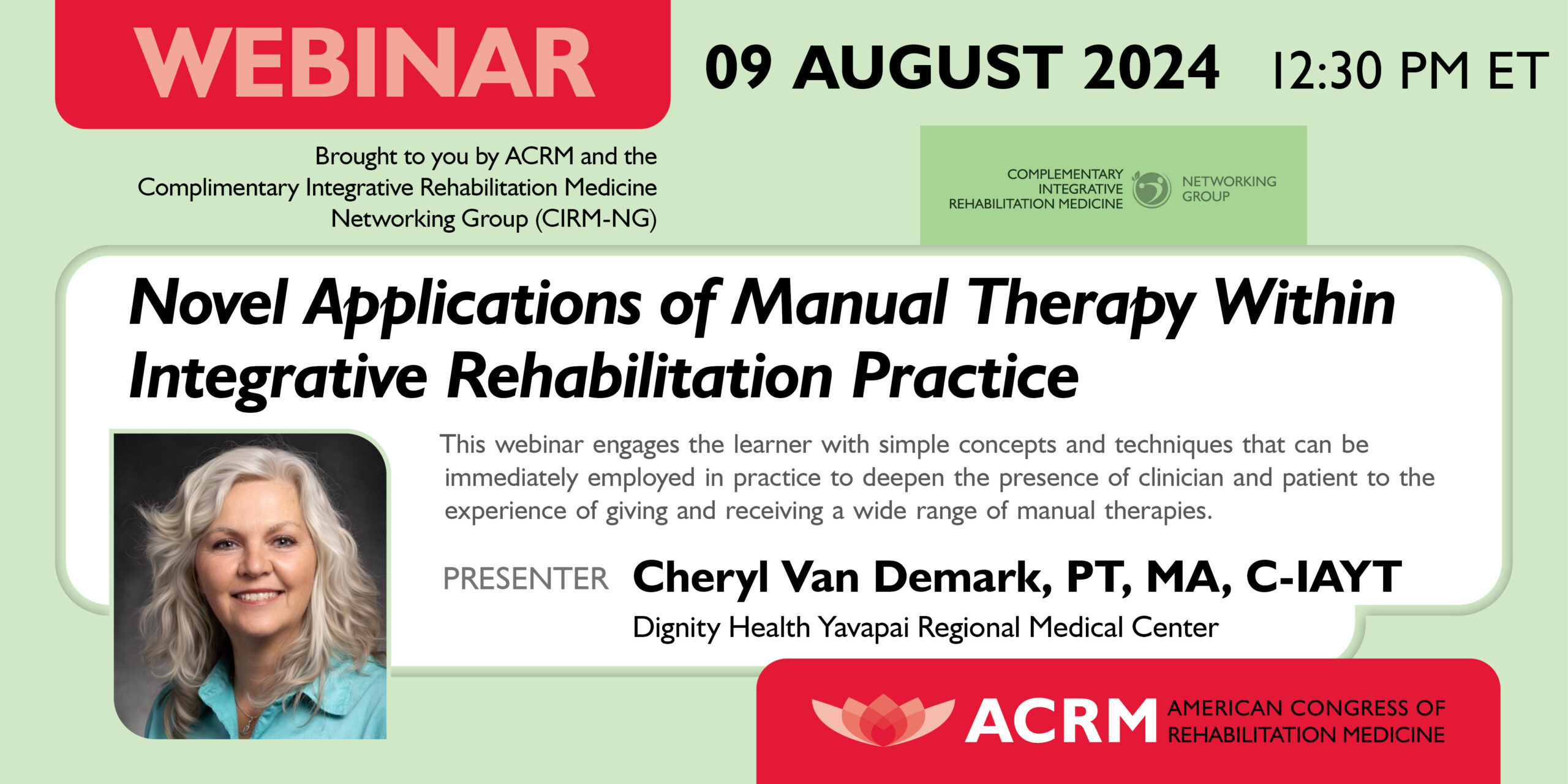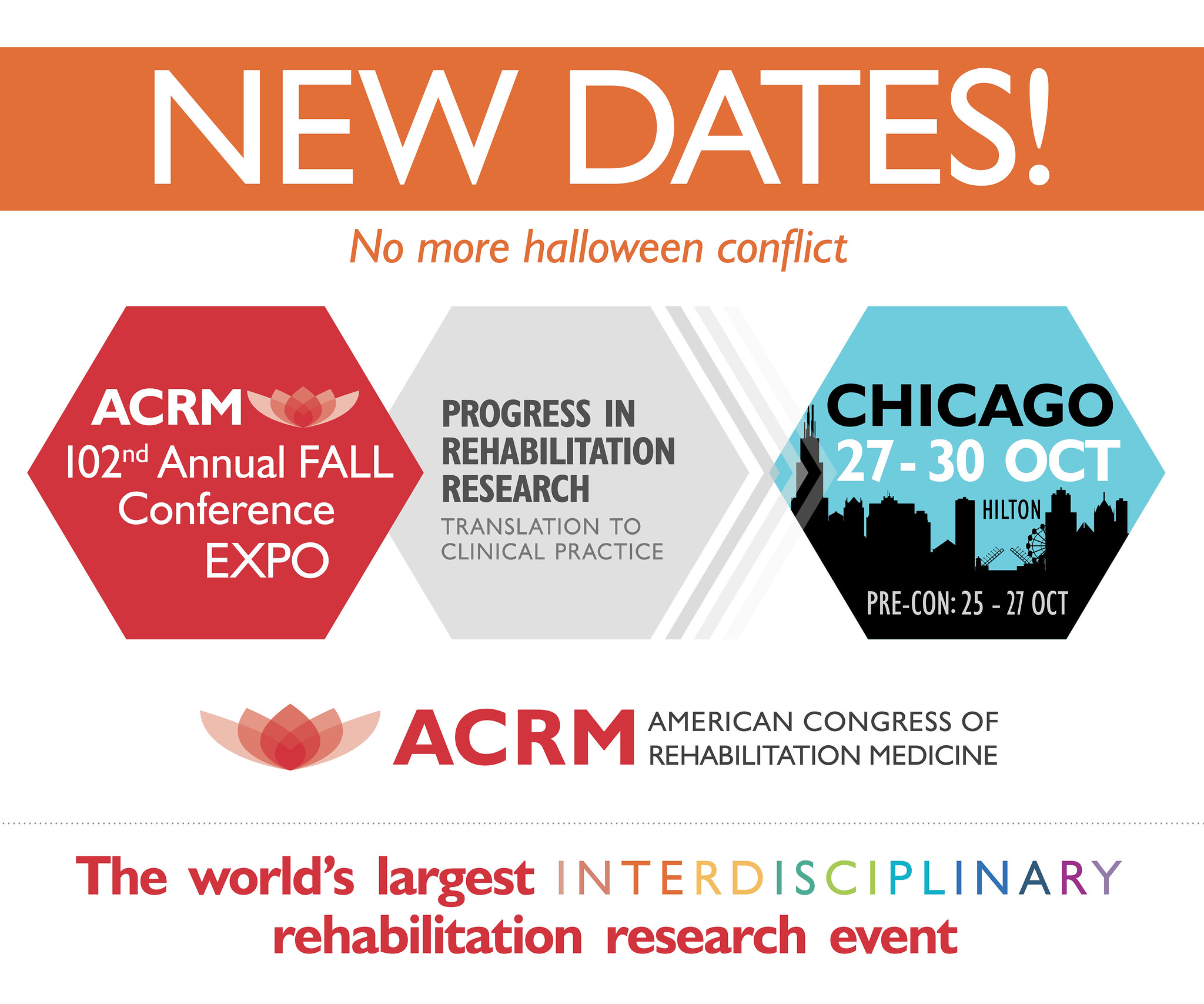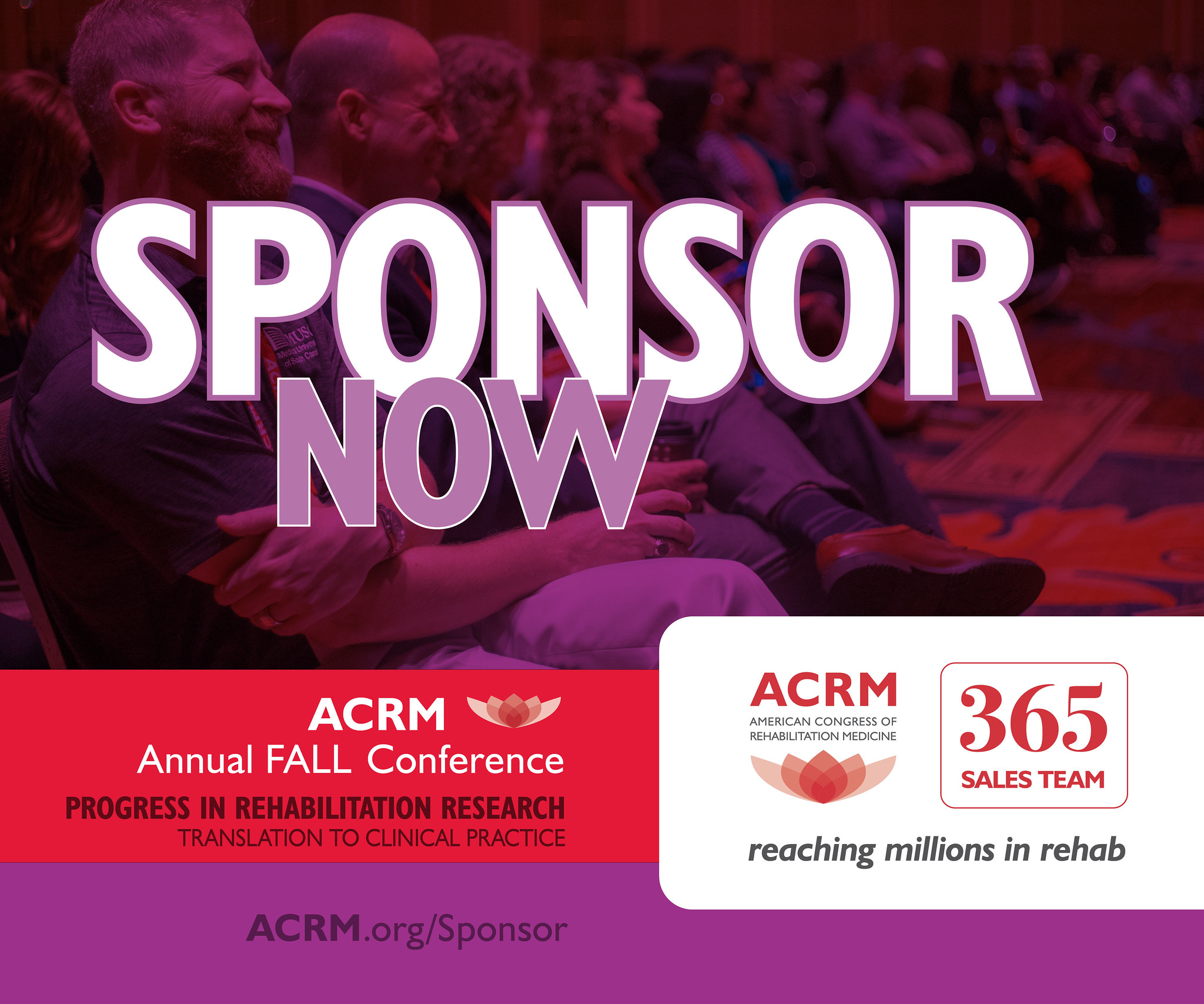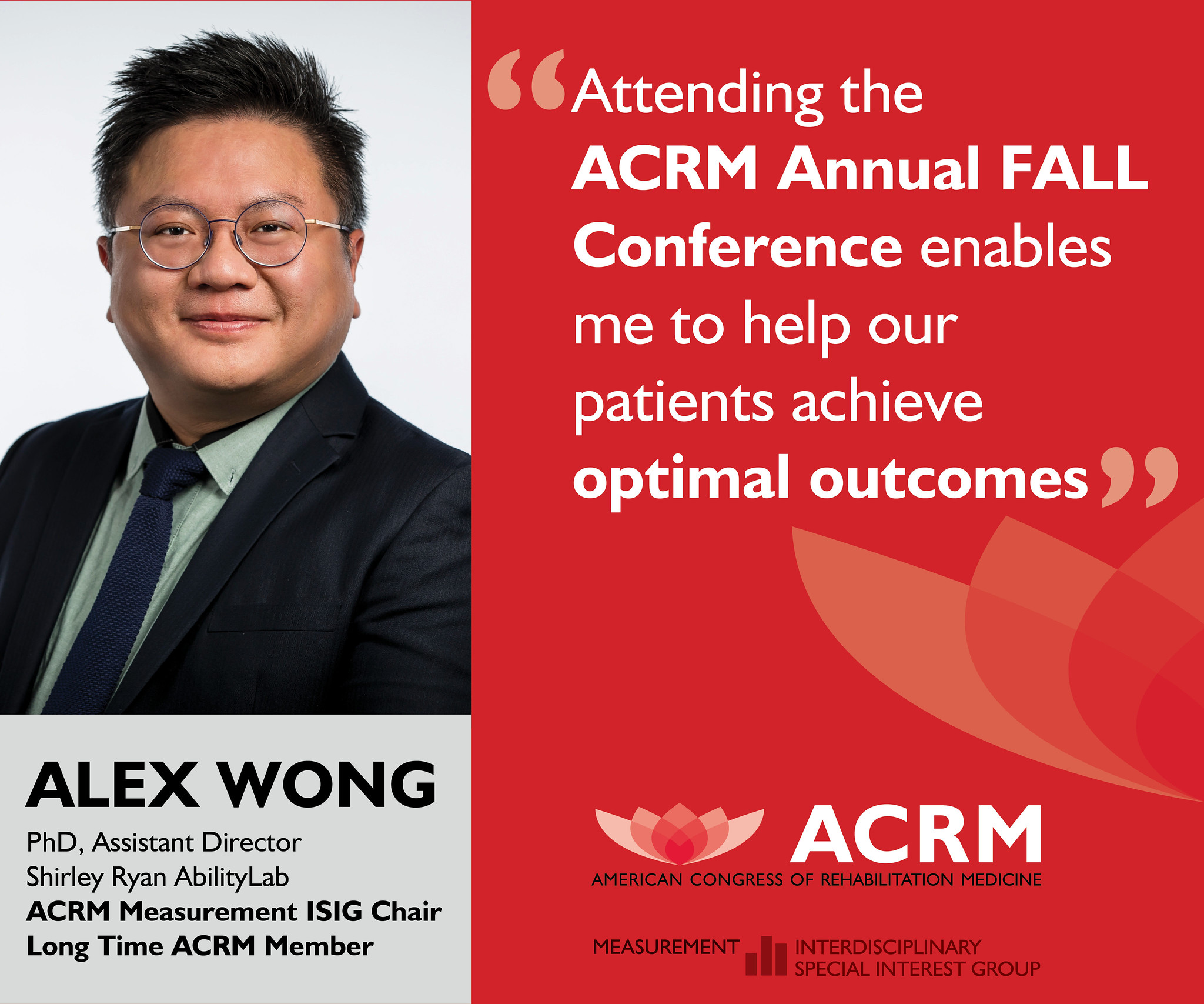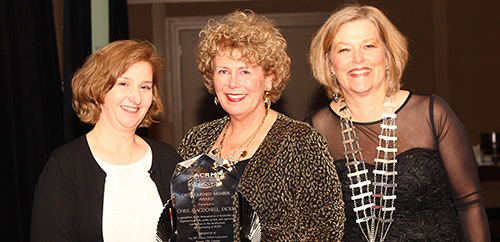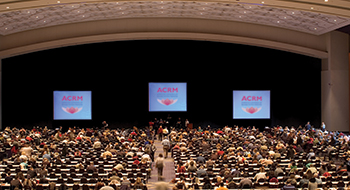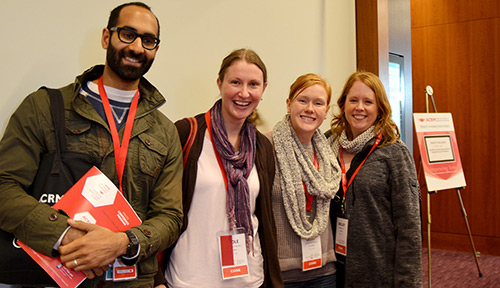Hot Topics in CIRM Webinar Series — FREE
Recent Webinar — FREE
Get the presentation slides
9 AUGUST 2024 // 12:30 PM ET
“Novel Applications of Manual Therapy Within Integrative Rehabilitation Practice”
PRESENTER: Cheryl Van Demark, PT, MA, C-IAYT,Dignity Health Yavapai Regional Medical Center, Prescott, Arizona
PAST WEBINARS — FREE
Novel Applications of Manual Therapy Within Integrative Rehabilitation Practice
Get presentation slides
With guest speaker, Cheryl Van Demark, PT, MA, C-IAYT, Associate Professor of Movement, The University of Illinois at Chicago
Navigating life as a health professional calls upon us to continually refresh our knowledge and weave it wisely and heartfully into the art of clinical practice. Guiding our integration of manual therapies into rehabilitation based on scientific evidence is both necessary and problematic when we consider the balance of what is known of its efficacy with all that is yet unknown about the influence of touch upon the experience of healing. This webinar engages the learner with simple concepts and techniques that can be immediately employed in practice to deepen the presence of clinician and patient to the experience of giving and receiving a wide range of manual therapies.
Movement for the Whole-Person: Rehabilitation & Research using the Laban/Bartenieff Movement System to Integrate Function & Expression
With guest speaker, Amita Nathwani, MA Ayur, University of Arizona, Andrew Weil Center for Integrative Medicine
This workshop will overview major categories of the Laban/Bartenieff Movement System (LBMS) as such a comprehensive movement language; give participants an experiential taste of LBMS basics; show how LBMS can enhance rehab professionals toolkit for supporting patients wholeness and healing; and share our recent research on motion and emotion connections.
Ayurveda’s Role in Rehabilitation
With guest speaker, Rachelle Tsachor, CMA, RSMT, ATI, Associate Professor of Movement, The University of Illinois at Chicago
This webinar will take you into the world of Ayurvedic Medicine and how it approaches Rehabilitation. Learn about these 5000 year-old techniques that approach patient care from both a pathological and functional perspective and in-turn allow healing on a mind-body level. You will take away tools to integrate into your own practice.
Empowering the Body ~ Mind with the Imagination
With guest speaker, Susan Ezra, RN, NC-BC, ACC Board Certified Nurse Coach at Holistic Health and Wellness Coaching
In this webinar, we will explore the role the imagination plays in the mind/body connection, where imagination comes from and how it is present in our lives. We will discuss the therapeutic process of guided imagery and four imagery interventions for application in clinical practice. Participants will also experience a guided imagery exercise.
Update of Acupuncture Research & Clinical Applications
with guest speaker, Wei Huang MD, PhD, Associate Professor, Rehabilitation Medicine, Emory University School of Medicine
Acupuncture is a hot topic in health care. Sorting through the research on this topic is no easy task. Come and join us to hear about the current state of research and clinical applications for this century’s old aspect of Traditional Chinese Medicine, and its relevance to integrative rehabilitation.
The Power and Limits of Touch
With guest speaker, Steve Haines, BCST, Certified TRE® Provider
Author of the award-winning “Anxiety is Really Strange”
Explore the topic of touch, including in relation to manual (hands-on) therapies.
In this webinar, you will hear about:
1. Why touch is essential for humans
2. The concept of inward touch and outward touch
3. The limits of touch
4. Relational Touch – a new paradigm
The slow background tone of the body, coupled with slow forms of touching, are fundamental to consciousness and developing our sense of self. Clinicians who offer hands-on therapies can effect enormous change by using slow touch to support feeling safe. Interoception is a relatively new term, and powerful new research paradigm, that describes how we feel. It radically changes our understanding of how touch works. How we feel and connect internally determines our ability to perceive and interact with the world of people and things around us. Touch in manual therapy does not work in the way most people think it does. Evidence increasingly shows there are clear limits to our ability to diagnose and treat structural issues by focusing on local tissue dynamics. We can however negotiate ‘affective touch’ to help people come out of stressed or dissociative states, feel new and different qualities in themselves, and find safety and agency. Join us to explore these topics!
Neurofeedback—An Evolving Discipline: Overview & Applications
With guest speaker, John S. Anderson, MA, BCB, BCN, QEEG-D, Minnesota NeuroTraining Institute
This webinar will provide a brief overview of a field that began with animal physiology studies, including operant conditioning of scalp electrical activity in cats, to a worldwide neuroscience specialty that has a well-documented history of efficacy for a growing list of medical and psychological disorders. If it has to do with the central nervous system, neurofeedback has likely been studied as a possible intervention. We will touch on the research base, how the evolution of neurofeedback has progressed and what the future holds. We will pay particular attention to the use of neurofeedback for attention disorders such as ADHD, anxiety and depression, PTSD, migraine and traumatic brain injury.
Breath & Healing
With Kellie Finn, 500 E-RYT, MS Yoga Therapy, C-IAYT, Clinical Supervisor, Adjunct Faculty, Maryland University of Integrative Health
Our health at every level is dependent on having vital companionship with the breath. It’s the connecting force that fuels every cell of our body and every cell beyond our body, yet, how often do you consciously engage with your breathing? How often are you aware of the breathing patterns of others? How might cultivating a personal breathing practice and increasing sensitivity to the breath make you a better practitioner? In this webinar we will examine what breath practices are, how to build a personal practice, and how breath can be a potent element both on it’s own and as a supplement to many complementary and integrative rehabilitation modalities.
Tai Chi for Rehabilitation
With Paul Lam, MD, Director, Tai Chi for Health Institute
Tai chi was created based on nature and harmony. The gentle flowing movements contain inner power that strengthens the body, improves mental balance, and brings better health and harmony to people’s lives. Nowadays, tai chi is practised in every corner of the world for health improvement. And for good reasons. Scientific studies show that tai chi improves and possibly prevents chronic conditions such as arthritis, heart disease, and diabetes. In addition, it improves balance, immunity and reduces stress.
Using Mindfulness to Explore the Links Between Trauma, Stories, and Illness
With Mark Pirtle, PT, DPT, University of Arizona Center for Integrative Medicine Fellowship Program
There is growing understanding of the complex ways in which our life experiences, stress, and trauma interact in the emergence of our health. Using mindfulness and meditation principles practices can support the development of clearer and healthier relationships with ourselves, our health challenges, others, and the world around us. This novel presentation discusses the intersection of mindfulness, narrative medicine, and more.
Sensitized Chronic Pain Causes Stress Responding that is Moderated by Effects of Heart Rate Variability Biofeedback on the Baroreceptor Reflex
With Jack Ginsberg, PhD
Merging Yoga and Rehabilitation Therapy for Best Results
With Arlene A. Schmid, PhD, OTR, FAOTA



